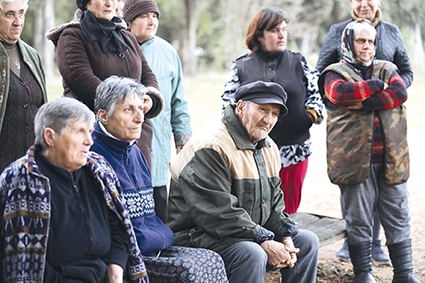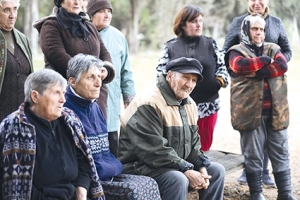Rural Support Program Kicks Off in Borjomi
In late January, the Georgian Ministry of Regional Development and Infrastructure (MRDI) announced a new initiative titled Rural Support Program. The program, aimed at contributing to the development of rural areas, will allow the residents of 3,700 villages to vote on how to allocate funds locally, primarily to small infrastructure projects.
This past Thursday, the program commenced with activities in the village of Tabatskuri, in the Borjomi Municipality. So far, 2,300 villages have made decisions regarding small infrastructure projects in the field of agriculture.
Projects include rehabilitation of drinking water reservoirs and drainage channels, building or repairing community event halls, covering water wells, building or renovating kindergarten playgrounds, repairing bridges, installing street lights, restoring a cemetery gate and water supply, rehabilitating a library and creating a visitor reception area, arranging a “heroes memorial” and culture house, installing a pedestrian bridge and paving internal roads, and arranging a public exercise space.
The projects should all be approved by the City Halls of the villages’ respective municipalities by April 1, after which construction on the projects is expected to begin. If City Halls fail to approve the spending of the funds allocated to them by the central government, or residents cannot come to a consensus on what small projects to finance, the funds will be returned to the state budget and used to support other rural development projects. In rural support programs, small infrastructural projects are financed in municipalities. Villages are allocated an amount between 5-20 thousand GEL ($1.9 – 7.5 mln), depending on population size. Projects are also expected to be co-financed, from international donor organizations, the municipal budget, or other available funds.
Over a two-month period, meetings are being held between executive and legislative authorities, municipalities, and representatives of local self-government bodies such as Local Action Groups. During these meetings, the parties discuss issues of funding projects in rural areas, the target populations’ needs, and village conditions.
When the program was announced, Minister of Regional Development and Infrastructure Maia Tskitishvili emphasized the importance of including the local population in the decision-making process, saying, “We see a very important platform being created. Direct communication will take place between the central and local governments and the local population.” The initiative is part of the government’s efforts to decentralize power, giving more autonomy to municipalities, and to improve the quality of life in rural areas, stemming what could become catastrophic waves of rural-urban migration, or emigration abroad.
In pre-planning phases of the program, MRDI officials met with municipal authorities in 800 villages. Among the projects with the highest demand are repairs to drinking water infrastructure, irrigation and drainage systems, road and bridge renovations, installation of street lighting, and building or improving sporting and cultural facilities. A total of 40 million GEL ($15 mln) is being allocated for the initiative – double the original sum. The Rural Support Program was expanded a month after it was announced, on February 1, due to high demand and popularity.
By Samantha Guthrie
Image source: Ministry of Regional Development and Infrastructure












